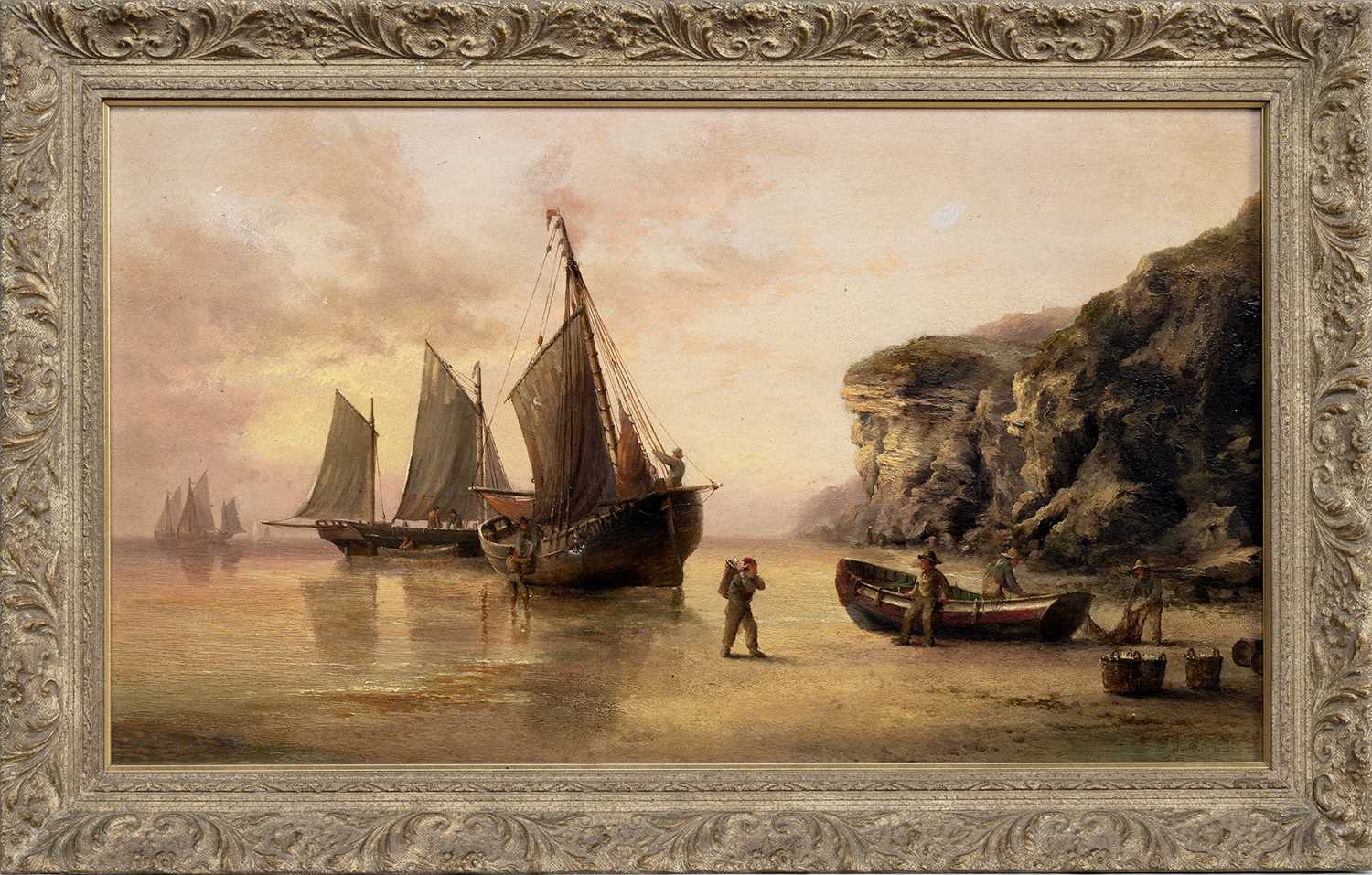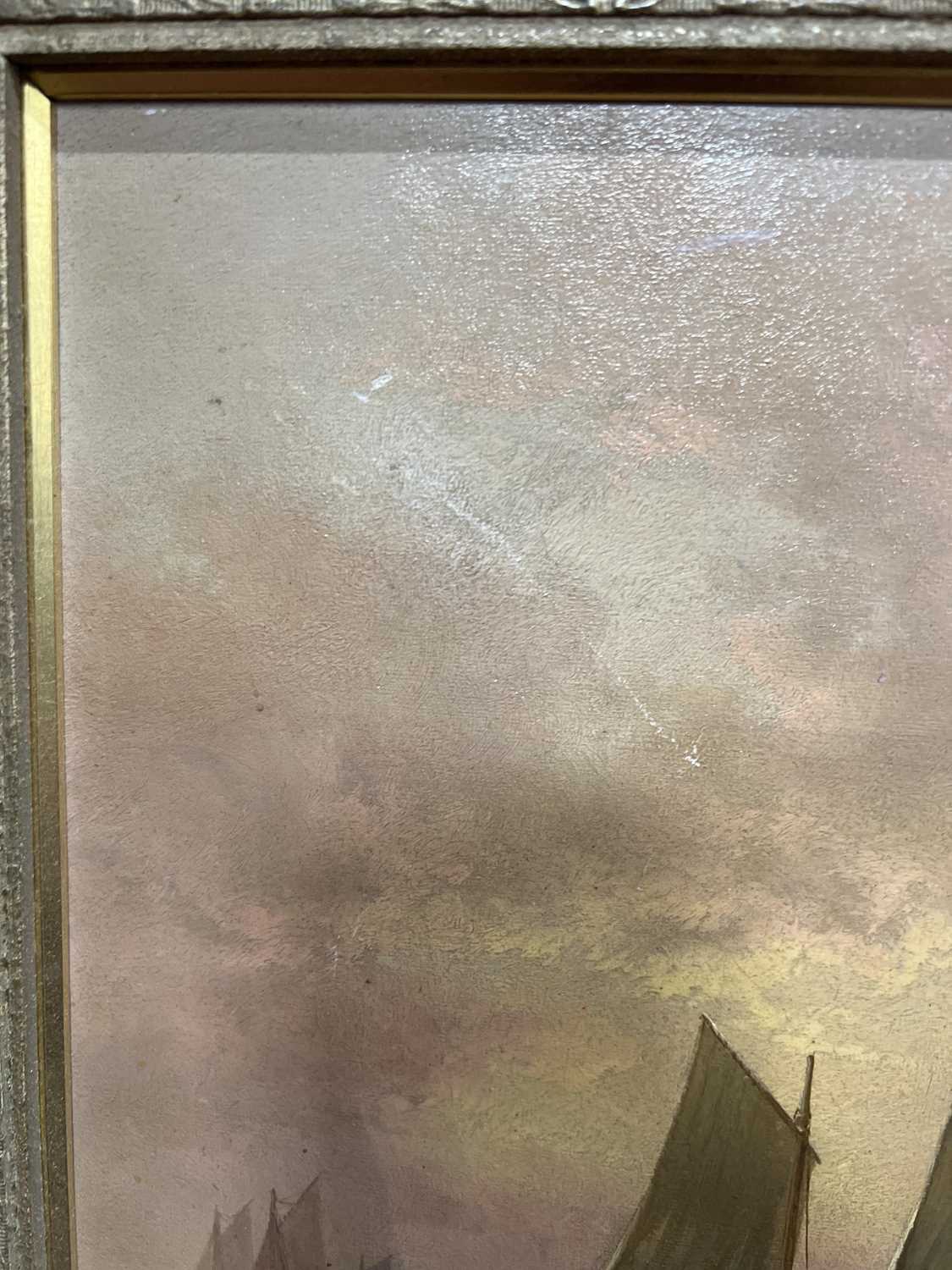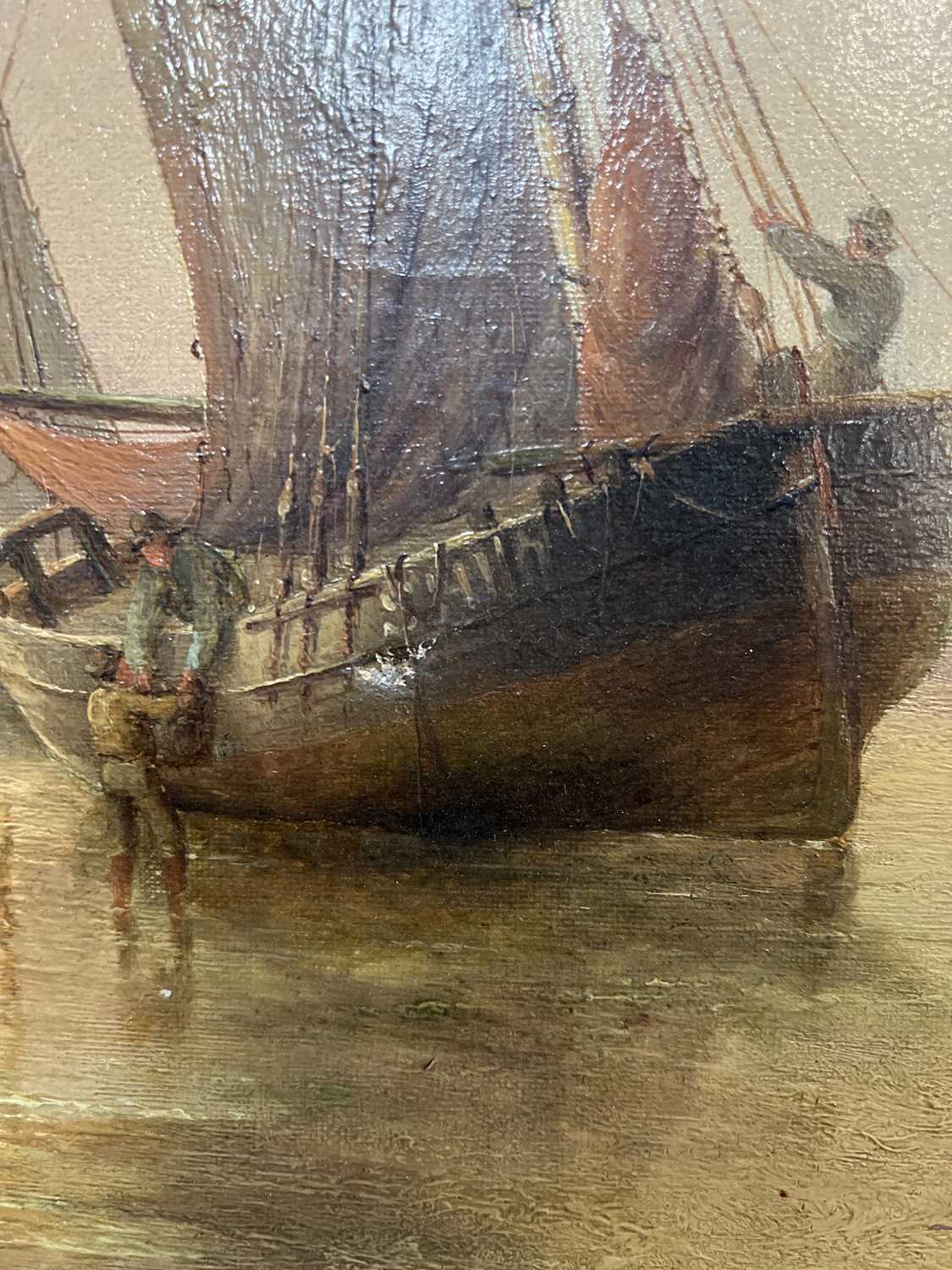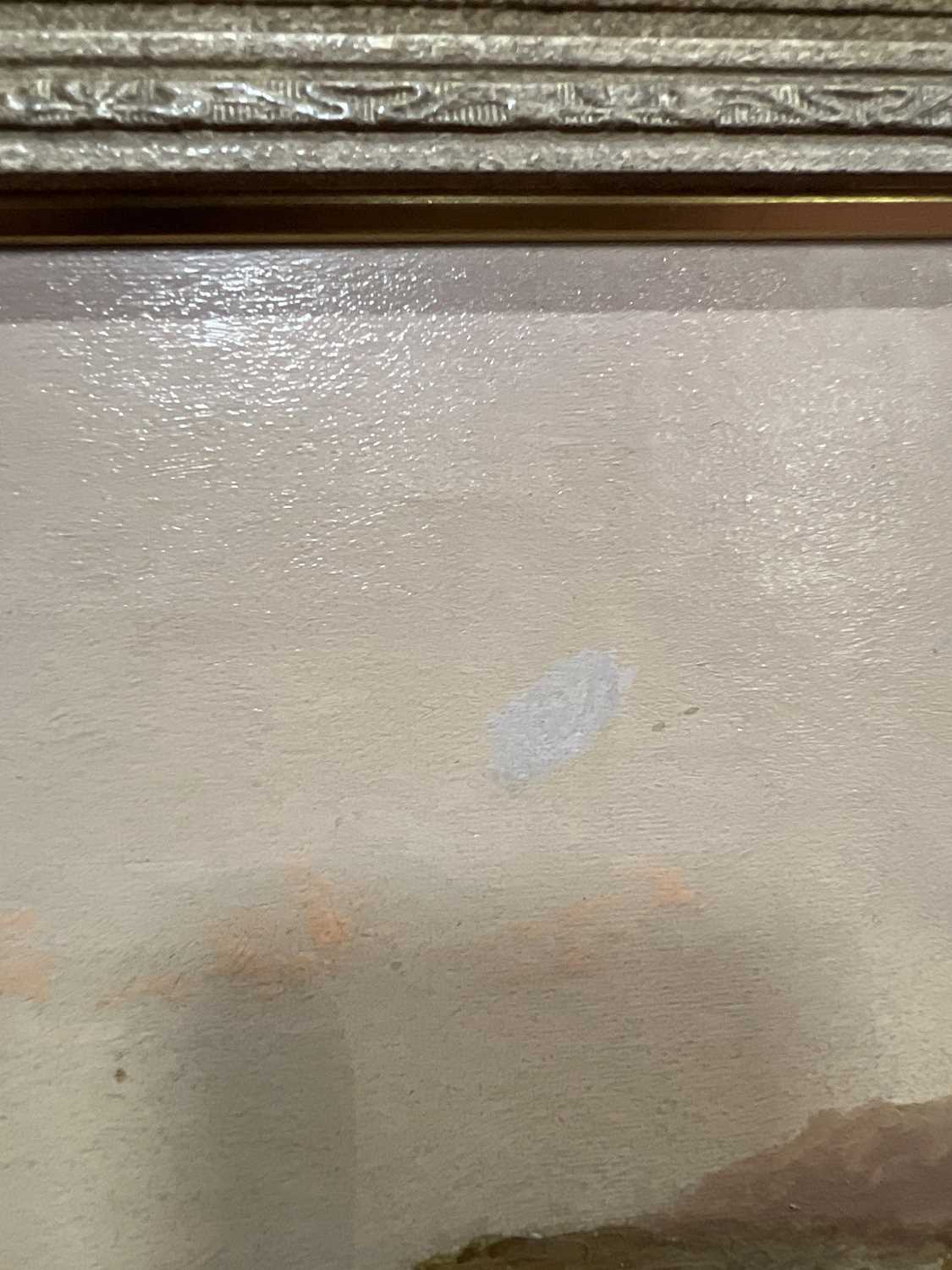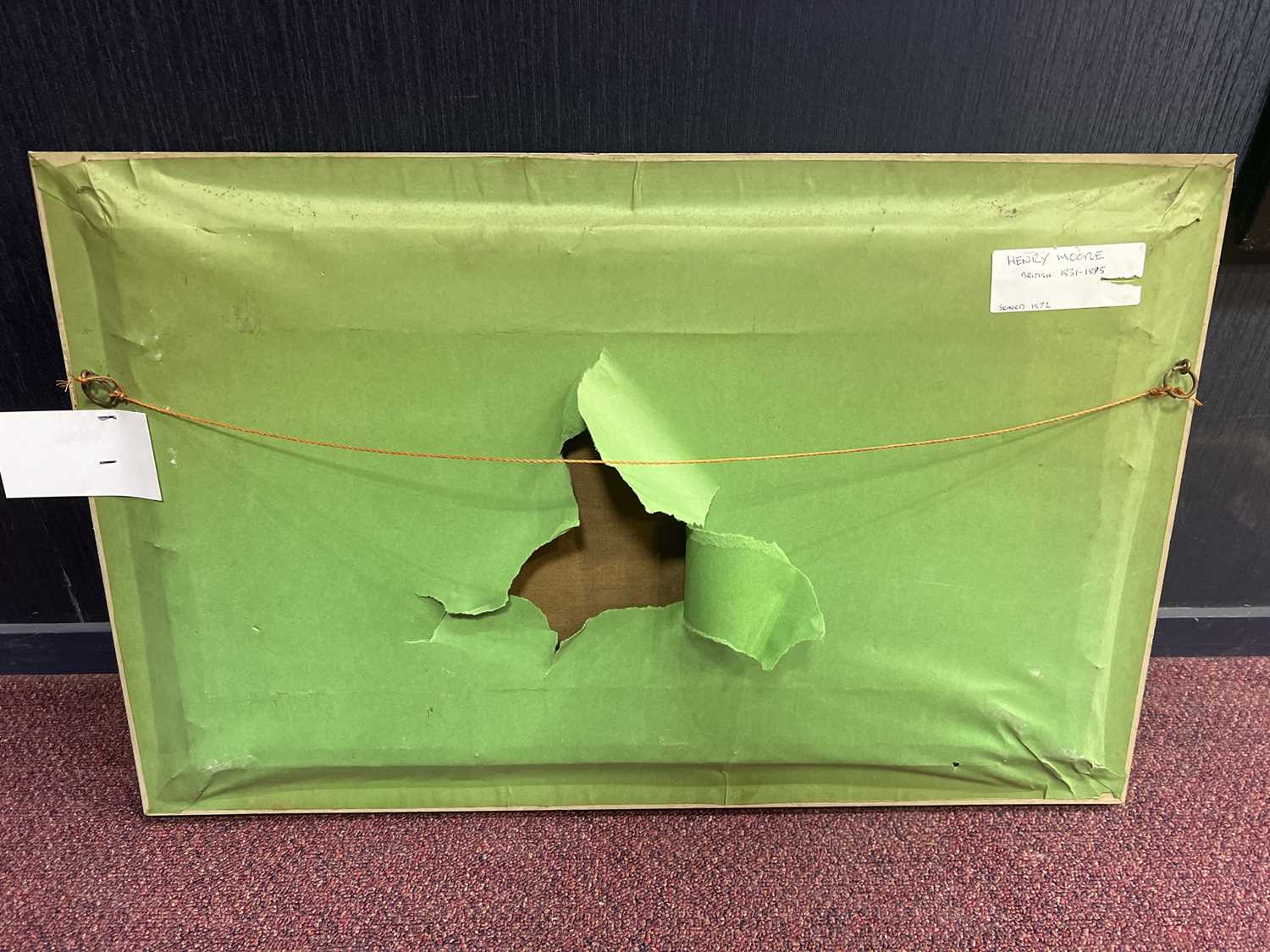478
HENRY MOORE RA RBA RWS (BRITISH 1831 - 1895), UNLOADING THE CATCH
oil on canvas, signed and dated 1872
framed
image size 34cm x 59cm, overall size 44cm x 70cm
Note: A member of a distinguished family of Yorkshire artists, Henry Moore rose to become one of the best marine painters of his day. Working in both oil and watercolour, he treated the sea ‘as a subject sufficient in itself, rather than simply the background of a battle, shipwreck, or even landscape’. Henry Moore was born at 14 Castlegate, York, on 7 March 1831, the tenth of fourteen children of the portrait painter, William Moore, and the second son by his second wife, Sarah Collingham. Four of his brothers were artists: Edwin Moore, William Moore Jr, John Collingham Moore and, most notably, the youngest, Albert Moore, a leading painter of the Aesthetic Movement. Henry Moore studied under his father before attending York School of Design, from 1851. Two years later, in 1853, he moved to London, where he joined his brother, John, in lodgings near Oxford Street, and began to exhibit at the Royal Academy, even before he entered the Royal Academy Schools at the end of the year. Indeed, while he remained at the RA Schools for only a few months, he continued to exhibit at the RA almost annually. In 1855, he also began to exhibit at the Society of British Artists, the British Institution and the Portland Gallery. He spent the summers of 1855 and 1856 painting the mountains of Servoz, near Chamonix, and first became known for producing Alpine as well as British landscapes in the Pre-Raphaelite manner. In 1857, a series of visits to Clovelly on the north Devon coast inspired Moore to turn to marine subjects, and especially panoramic vistas of the open sea, which he believed had not been fully achieved in painting before. In the decade or so following his marriage to Mary Bollans, of York, on 19 July 1860, he divided his time between landscapes and seascapes, and developed a reputation for his precise observation of the atmosphere and form of the sea. However, he gradually modified his style, employing broader handling and bolder colour. The evolution and increased mastery of his work were based on extended experience and careful study, made on board ship as well as from land. He was known to cross England in order to observe a bad storm. Though elected a member of the Society of British Artists in 1867, Moore resigned eight years later, at the time that he began to devote himself completely to seascapes. He exhibited these at a wider range of metropolitan venues, including the Dudley Gallery, the Grosvenor Gallery (founded in 1877) and the New Gallery (founded in 1888), and in the provinces. Elected to the membership of the Royal Society of Painters in Water-Colours (ARWS 1876, RWS 1880) and the Royal Academy (ARA 1885, RA 1893), he was also awarded the grand prix at the Exposition Universelle, Paris (1889) and, as a result, the Légion d’honneur. In 1887, the Fine Art Society mounted a large solo show of his work, while he was represented alongside his father and brothers in an exhibition devoted to the Moore family of painters in York in 1895. For much of his career, Moore had lived in Sheffield Terrace, Kensington, and it was there that he and his wife brought up their two daughters, Agnes and Florence, the first of whom became a painter of flowers. However, late in the 1880s, they moved to 39 Maresfield Gardens, Hampstead. Henry Moore died at the High Cliff Hotel, Margate, on 22 June 1895. His work is represented in numerous public collections, including the British Museum, Tate and the V&A; and Birmingham Museums and Art Gallery, Leamington Spa Art Gallery & Museum, Manchester Art Gallery and York Art Gallery.
oil on canvas, signed and dated 1872
framed
image size 34cm x 59cm, overall size 44cm x 70cm
Note: A member of a distinguished family of Yorkshire artists, Henry Moore rose to become one of the best marine painters of his day. Working in both oil and watercolour, he treated the sea ‘as a subject sufficient in itself, rather than simply the background of a battle, shipwreck, or even landscape’. Henry Moore was born at 14 Castlegate, York, on 7 March 1831, the tenth of fourteen children of the portrait painter, William Moore, and the second son by his second wife, Sarah Collingham. Four of his brothers were artists: Edwin Moore, William Moore Jr, John Collingham Moore and, most notably, the youngest, Albert Moore, a leading painter of the Aesthetic Movement. Henry Moore studied under his father before attending York School of Design, from 1851. Two years later, in 1853, he moved to London, where he joined his brother, John, in lodgings near Oxford Street, and began to exhibit at the Royal Academy, even before he entered the Royal Academy Schools at the end of the year. Indeed, while he remained at the RA Schools for only a few months, he continued to exhibit at the RA almost annually. In 1855, he also began to exhibit at the Society of British Artists, the British Institution and the Portland Gallery. He spent the summers of 1855 and 1856 painting the mountains of Servoz, near Chamonix, and first became known for producing Alpine as well as British landscapes in the Pre-Raphaelite manner. In 1857, a series of visits to Clovelly on the north Devon coast inspired Moore to turn to marine subjects, and especially panoramic vistas of the open sea, which he believed had not been fully achieved in painting before. In the decade or so following his marriage to Mary Bollans, of York, on 19 July 1860, he divided his time between landscapes and seascapes, and developed a reputation for his precise observation of the atmosphere and form of the sea. However, he gradually modified his style, employing broader handling and bolder colour. The evolution and increased mastery of his work were based on extended experience and careful study, made on board ship as well as from land. He was known to cross England in order to observe a bad storm. Though elected a member of the Society of British Artists in 1867, Moore resigned eight years later, at the time that he began to devote himself completely to seascapes. He exhibited these at a wider range of metropolitan venues, including the Dudley Gallery, the Grosvenor Gallery (founded in 1877) and the New Gallery (founded in 1888), and in the provinces. Elected to the membership of the Royal Society of Painters in Water-Colours (ARWS 1876, RWS 1880) and the Royal Academy (ARA 1885, RA 1893), he was also awarded the grand prix at the Exposition Universelle, Paris (1889) and, as a result, the Légion d’honneur. In 1887, the Fine Art Society mounted a large solo show of his work, while he was represented alongside his father and brothers in an exhibition devoted to the Moore family of painters in York in 1895. For much of his career, Moore had lived in Sheffield Terrace, Kensington, and it was there that he and his wife brought up their two daughters, Agnes and Florence, the first of whom became a painter of flowers. However, late in the 1880s, they moved to 39 Maresfield Gardens, Hampstead. Henry Moore died at the High Cliff Hotel, Margate, on 22 June 1895. His work is represented in numerous public collections, including the British Museum, Tate and the V&A; and Birmingham Museums and Art Gallery, Leamington Spa Art Gallery & Museum, Manchester Art Gallery and York Art Gallery.
British & International Pictures
Sale Date(s)
Venue Address
General delivery information available from the auctioneer
McTear's are pleased to offer a global packing and shipping service through the experts at Auction Logistics from Mail Boxes Etc. If you are using the-saleroom.com bidding platform, the shipping prices for most lots in our Specialist Sales are on the-saleroom.com lot detail pages in advance of the sale day. the-saleroom.com buyers can purchase shipping conveniently online by following the payment link received by email after the sale.
Auction Logistics from Mail Boxes Etc. offer a complete collect, pack and ship service to most global destinations and include up to £150 Inclusive Cover protection per lot, with the option to upgrade the cover to the full amount paid for the item/s*.
Auction Logistics (Mailboxes)
E: auctionlogisticsenquiries@mbe.uk
T: 0871 221 1233
“Calls charged at £0.13 per minute from UK landlines and mobiles plus your phone company's access charge”
Buyers can instruct a packer and shipper of their choice. Other options available are:
Collin Moran & Son Ltd
collin@collinmoranandson.co.uk
0141 849 1947
Aardvark Art Services Ltd (Specialist Painting Couriers)
E: info@aardvarkartservices.com
T: 01253 794673
Important Information
McTear's require photographic ID from every client before purchased goods can be released.
Viewing times:
Monday 9th - 12pm-5pm
Tuesday 10th - 9am-5pm
Wednesday 11th - 9am-1pm
Please Note: McTear’s reserve the right to charge the card you used to register for live bidding within 24 hours of the auction finishing unless other arrangements are agreed with McTear’s prior to the sale.
Buyer`s Premium 24% + VAT
Lots purchased online with the-saleroom.com will attract an additional charge for this service in the sum of 4.95% of the hammer price plus VAT at the rate imposed
For purchases we recommend packing and shipping companies such as:
Collin Moran & Son Ltd
collin@collinmoranandson.co.uk
0141 849 1947
Mailboxes
info@mbewoodlandsroad.co.uk
0141 332 6555
admin@mbeshawlands.co.uk
0141 649 6777
Aardvark Art Services Ltd
info@aardvarkartservices.com
01253 794673
Alban Shipping
info@albanshipping.co.uk
01582 493 099
Pack & Send (Glasgow)
glasgow@packsend.co.uk
0141 405 1535
Pack & Send (Edinburgh East)
edinburgheast@packsend.co.uk
0131 201 2244














